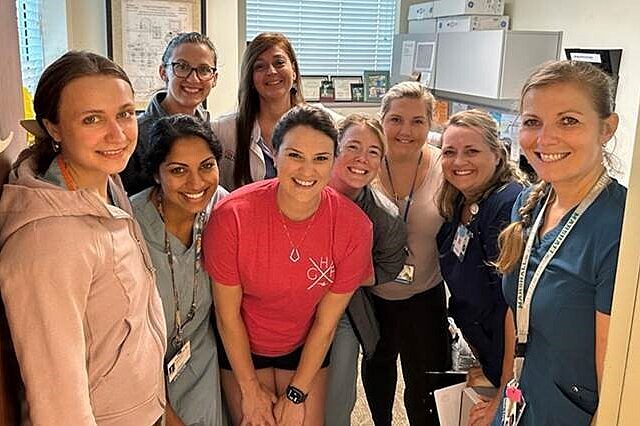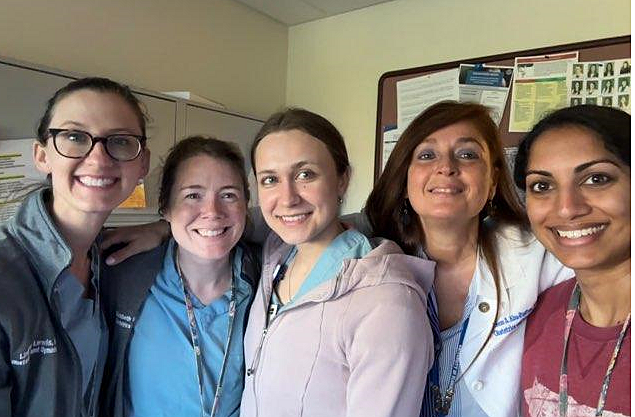UF Ob/Gyn Residents Become First in U.S. to Earn ISUOG Certification

The University of Florida has set a new standard for ultrasound training while paving a new path for resident Ob/Gyn physicians in the United States.
Thanks to a four-year effort that called on contributions from the entire UF Department of Obstetrics & Gynecology, the university is now home to the first U.S.-based Ob/Gyn resident physicians to be certified by the International Society of Ultrasound in Obstetrics and Gynecology (ISUOG), the leading international society of experts in the field.
“It is wonderful to have all that effort validated in a meaningful way,” said Jessica Heft, MD, MS, assistant professor and residency program director. “Our chief residents get to say they are the first U.S. residents to be certified by the ISUOG. Ultrasound is the imaging modality of choice in Ob/Gyn so this distinction gives our graduates a huge leg up in performing and interpreting their own studies. This ensures quality, efficiency and cost effectiveness. Most of all, this is good for our patients.”
To make it happen, Reem Abu-Rustum, MD, associate professor in the division of maternal fetal medicine, worked closely with the Ob/Gyn Class of 2023 residents Margarita Berwick, MD, Lindsey Lewis, MD, MPH, Ishana Shetty, MD, and Elizabeth Wilkinson, MD, to pilot a longitudinal ultrasound curriculum in residency.
Over the last four years, Dr. Abu-Rustum and the Ob/Gyn residents Class of 2023 collaborated to complete each step of the curriculum, which is based on recommendations published several years ago by the American Institute of Ultrasound in Medicine (AIUM) pertaining to what an ideal ultrasound educational experience looks like for Ob/Gyn residents.
“Dr. Abu-Rustum is the visionary in all this,” Dr. Heft said. “She designed an innovative, comprehensive four-year curriculum that mirrored the AIUM recommendations. She is also one of the most humble people you will ever meet.”
The department-level effort resulted in UF accomplishing what no residency has been able to do, which is incorporate a comprehensive ultrasound experience into their program throughout all four years. It’s a daunting task as Ob/Gyn requires so much to be covered in four years, and it stands as the only specialty that is considered a surgical specialty and a primary care specialty.
“That doesn’t even include the ICU-level training they also need for labor and delivery,” Dr. Heft said. “The range of what they have to learn is massive: how to handle intraoperative hemorrhage during a hysterectomy, how to work up infertility, how to take care of a pregnant woman with a history of heart transplant, how to treat osteoporosis. The depth and breadth of our field is huge and continues to grow. Adding another curriculum to the to-do pile is overwhelming.”
The curriculum, called UF Ob/Gyn Sonographic Training, involved structured lectures, assigned reading, one-on-one teaching sessions, simulation training and lots of hands-on practice. Devising such a curriculum is challenging as it demands significant time, space, resources and faculty. Still, the importance of creating one has always been there as ultrasound is the most important modality in Ob/Gyn.
“Obviously, we use it all the time in pregnancy, but it is also considered the gold standard for viewing female pelvic anatomy,” Dr. Heft said. “Ultrasound is used for everything from identifying congenital anomalies to helping assess post-op complications to visualizing life-threatening pathology.”
To validate the UF curriculum, the department worked diligently to get buy-in from the ISUOG since the association is finalizing its process of providing certificates of completion to physicians internationally upon successfully going through ISUOG’s Basic Training Program. To that end, ISUOG has devised a robust testing process for the theoretical and practical components of the curriculum.
Given the overlap between the AIUM and ISUOG’s Basic Training curricula, and the fact that ISUOG educational material was incorporated into UF’s curriculum, Dr. Abu-Rustum worked for months to get ISUOG’s leadership to agree to test our residents as a pilot to offer this testing to U.S. resident physicians (and others around the globe) in the future.
The exam the chief residents were faced with, called the ISUOG Basic Training Exam, included an online multiple-choice theoretical test, which had to be passed before taking the real-time practical test.
The practical assessment required in-person UF assessors and simultaneous virtual ISUOG international specialists from several different time zones to evaluate the residents in real time. This involved two stations: an assessment on a ScanBooster simulator for their Ob/Gyn skills, and another on an obstetric patient. The virtual ISUOG assessors were connected via WhatsApp and were simultaneously grading the UF residents together with our in-person assessors.
Still, despite the tall obstacles, all the UF residents cleared them and made a breakthrough by earning ISUOG certification. Upon receiving the news, Abu-Rustum wrote a heartfelt message to the residents:
“You have all made history as the first residents ever in the USA to receive ISUOG certification. What you have accomplished shall not only change the course of sonographic education in the USA, but the globe over, translating into better, safer care for all our patients. For me personally, this is an absolute highlight of my professional career.”
While making note of the heterogeneity in what is offered at different residency programs, Heft feels it’s important that Ob/Gyn in the U.S. starts to move toward standardization in ultrasound certification.
“We are hoping this curriculum serves as a model for other programs to implement formal ultrasound training,” Dr. Heft said. “Our chief residents are bright, diligent and invested. It’s exciting to be part of a group like this, and we are planning to continue to invest in this curriculum for years to come.”
About the author

